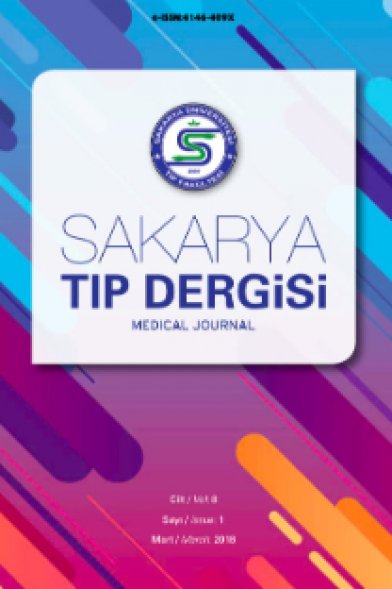Staphylococcus Aureus Ve Koagülaz Negatif Stafilokokların Vankomisin Ve Teikoplanin Duyarlılıklarının Araştırılmasında Otomatize Sistem İle E-Test Yönteminin Karşılaştırılması
Amaç Stafilokoklar hem toplumsal kaynaklı hem de hastane kaynaklı enfeksiyonlarda tedavisi zor etkenlerin başında gelmektedir. Metisilin direncinin oluşması tedavide glikopeptid grubuantibiyotiklerin kullanımını zorunlu hale getirmiştir. Glikopeptid antibiyotikler metisilin dirençli Stafilokok enfeksiyonlarında yaygın bir şekilde kullanılmasıyla birlikte son yıllardaglikopeptidlere orta duyarlı ve dirençli suşların bilidirilmeye başlanması nedeniyle bu antibiyotiklerin duyarlılığının hızlı ve doğru tanımlanması büyük önem taşımaktadır.Gereç ve Yöntemler: Çalışmamızda Kahramanmaraş Sütçü İmam Üniversitesi Tıp Fakültesi Hastanesi Tıbbi Mikrobiyoloji Laboratuarına gönderilen çeşitli klinik örneklerden izole edilen 100 Staphylococcusaureus ve 100 koagülaz negatif Stafilokok suşlarında vankomisin ve teikoplanin duyarlılıkları VITEK-2 (BioMeriéux, Fransa) otomatize sistemi ve E-test yöntemi ile araştırılmıştır.Antibiyotiklerin duyarlılıkları CLSI kriterlerine göre değerlendirilmiştir..Bulgular: E-test yöntemi ile tüm suşlar vankomisin ve teikoplanine duyarlı bulunmuştur. Otomatize sisteme göre tüm suşlar vankomisine duyarlı bulunurken MRSA suşlarından biri dirençli,MRKNS suşlarından biri orta duyarlı, MSKNS suşlarından yedisi orta duyarlı bulunmuştur.Sonuç: Çalışmamıza göre metisilin dirençli Stafilokokların tedavisinde glikopeptid antibiyotikler halen güvenle kullanılabilmektedir. Bununla birlikte orta duyarlı ve dirençli suşların bildirilmesinedeniyle bu antibiyotiklerin kullanımında temkinli olunması gerekmektedir. Bu nedenle glikopeptid antibiyotiklere duyarlılığın doğru ve hızlı belirlenmesi için en uygun yöntemlerinbelirlenmesi büyük önem taşımaktadır. ( Sakarya Tıp Dergisi 2017, 7(2):92-96 )
Comparison of Automated System and E-Test Method For The Detection of Vancomycin and Teicoplanin Sensitivities of Staphylococcus Aureus and Coagulase Negative Staphylococcus
Objective Staphylococcus are the leading agent of treatment difficulties in both community-acquired and hospital-acquired infections. The formation of methicillin resistance has made theuse of glycopeptide antibiotics compulsory in the treatment. Glycopeptide antibiotics have been widely used in methicillin-resistant Staphylococcal infections, but the rapid andaccurate identification of the susceptibility of these antibiotics is of great importance, since the susceptibility of intermediate susceptible and resistant strains to glycopeptides hasbegun to be known in recent years.Materials and Methods In our study, susceptibilities of vancomycin and teicoplanin in 100 Staphylococcus aureus and 100 coagulase negative Staphylococcus strains isolated from various clinical samplessent to Kahramanmaras Sutcu Imam University Medical Faculty Hospital Medical Microbiology Laboratory were investigated by VITEK-2 (BioMeriéux, France) automated system andE-test method. The sensitivities of antibiotics were evaluated according to CLSI criteria.Results All strains were found sensitive to vancomycin and teicoplanin by e-test method. According to the automated system, all strains were susceptible to vancomycin, whereas one MRSAstrain was resistant, one MRCNS strain was intermediate susceptible, and seven MSCNS were intermediate susceptible.Conclusion According to our study, glycopeptide antibiotics can still be safely used in the treatment of methicillin-resistant Staphylococcus. However, the use of these antibiotics should becautious because of the reporting of indermetidate susceptible and resistant strains. For this reason, it is of great importance to determine the most appropriate methods for accurateand rapid determination of glycopeptide antibiotic susceptibility. ( Sakarya Med J 2017, 7(2):92-96 )
___
- Referans1 Gemmel C.G. Glicopeptide resistance in Staphylococcus aureus:
is it a real threat? J Infect Chemother 2004; 10: 69- 75
- Referans2 Hiramatsu K, Cui L, Kuroda M, Ito T. The emergence and evolution
of methicillin-resistant Staphylococcus aureus. Trends in
Microbiology 2001; 9: 486- 93.
- Referans3 Tenover FC, Weigel M, Appelbaum PC, McDougal LK, and et
al. Vancomycin- Resistant Staphylococcus aureus Isolate from
a Patient In Pennsylvania. Antimicrobial Agents And Chemotherapy.
2004; 48: 275- 280.
- Referans4 Cookson B, Peters B, Webster M, et al. Staff carriage of epidemic
methicillin-resistant Staphylococcus aureus. J Clin Microbiol
1989;27:1471-6.
- Referans5 Kuşçu F, Öztürk DB, Gürbüz Y, Tütüncü EE, Şencan İ, Gül S.
Metisiline dirençli Stafi lokoklarda azalmış vankomisin duyarlılığının
araştırılması. Mikrobiyol Bul 2011; 45(2): 248-257.
